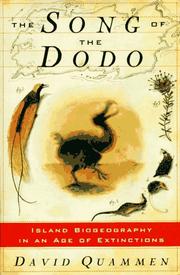Check nearby libraries
Buy this book

Thirty years ago, two young biologists named Robert MacArthur and Edward O. Wilson triggered a far-reaching scientific revolution. In a book titled The Theory of Island Biogeography, they presented a new view of a little-understood matter: the geographical patterns in which animal and plant species occur. Why do marsupials exist in Australia and South America, but not in Africa? Why do tigers exist in Asia, but not in New Guinea?
Influenced by MacArthur and Wilson's book, an entire generation of ecologists has recognized that island biogeography - the study of the distribution of species on islands and islandlike patches of landscape - yields important insights into the origin and extinction of species everywhere.
The new mode of thought focuses particularly on a single question: Why have island ecosystems always suffered such high rates of extinction? In our own age, with all the world's landscapes, from Tasmania to the Amazon to Yellowstone, now being carved into islandlike fragments by human activity, the implications of island biogeography are more urgent than ever.
Until now, this scientific revolution has remained unknown to the general public. But over the past eight years, David Quammen has followed its threads on a globe-circling journey of discovery. In Madagascar, he has considered the meaning of tenrecs, a group of strange, prickly mammals native to that island. On the island of Guam, he has confronted a pestilential explosion of snakes and spiders.
In these and other places, he has prowled through wild terrain with extraordinary scientists who study unusual beasts. The result is The Song of the Dodo, a book filled with landscape, wonder, and ideas. Besides being a grand outdoor adventure, it is, above all, a wake-up call to the age of extinctions.
Check nearby libraries
Buy this book

Previews available in: English
Showing 2 featured editions. View all 11 editions?
| Edition | Availability |
|---|---|
|
1
The Song of the Dodo: Island Biogeography in an Age of Extinction
April 14, 1997, Scribner
Paperback
in English
0684827123 9780684827124
|
eeee
Libraries near you:
WorldCat
|
|
2
The Song of the Dodo: Island Biogeography in an Age of Extinction
1996, Scribner
in English
0684800837 9780684800837
|
aaaa
Libraries near you:
WorldCat
|
Book Details
Edition Notes
Includes bibliographical references (p. [648]-671) and index.
Classifications
The Physical Object
ID Numbers
Source records
Scriblio MARC recordIthaca College Library MARC record
marc_openlibraries_phillipsacademy MARC record
Library of Congress MARC record
Internet Archive item record
marc_nuls MARC record
ISBNdb
marc_columbia MARC record
Work Description
David Quammen's book, The Song of the Dodo, is a brilliant, stirring work, breathtaking in its scope, far-reaching in its message -- a crucial book in precarious times, which radically alters the way in which we understand the natural world and our place in that world. It's also a book full of entertainment and wonders.
In The Song of the Dodo, we follow Quammen's keen intellect through the ideas, theories, and experiments of prominent naturalists of the last two centuries. We trail after him as he travels the world, tracking the subject of island biogeography, which encompasses nothing less than the study of the origin and extinction of all species. Why is this island idea so important? Because islands are where species most commonly go extinct -- and because, as Quammen points out, we live in an age when all of Earth's landscapes are being chopped into island-like fragments by human activity.
Through his eyes, we glimpse the nature of evolution and extinction, and in so doing come to understand the monumental diversity of our planet, and the importance of preserving its wild landscapes, animals, and plants. We also meet some fascinating human characters. By the book's end we are wiser, and more deeply concerned, but Quammen leaves us with a message of excitement and hope.
Excerpts
Community Reviews (0)
Feedback?History
- Created April 1, 2008
- 16 revisions
Wikipedia citation
×CloseCopy and paste this code into your Wikipedia page. Need help?
| July 30, 2024 | Edited by MARC Bot | import existing book |
| December 19, 2023 | Edited by ImportBot | import existing book |
| March 7, 2023 | Edited by MARC Bot | import existing book |
| October 7, 2021 | Edited by raybb | Edited without comment. |
| April 1, 2008 | Created by an anonymous user | Imported from Scriblio MARC record |













